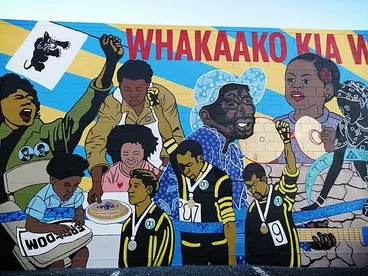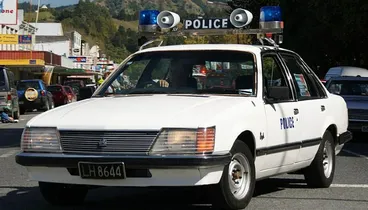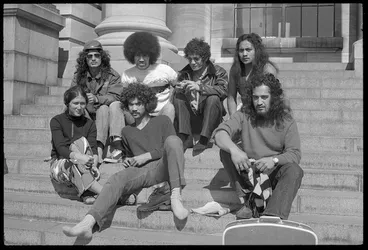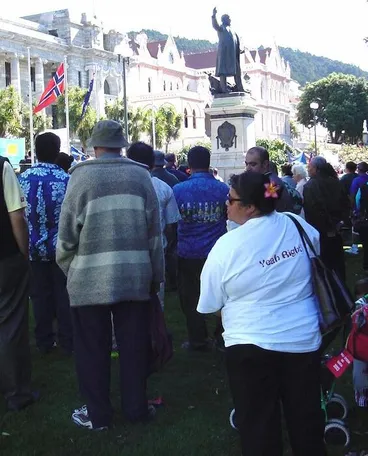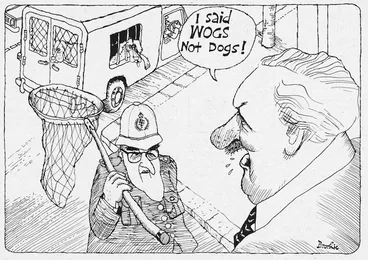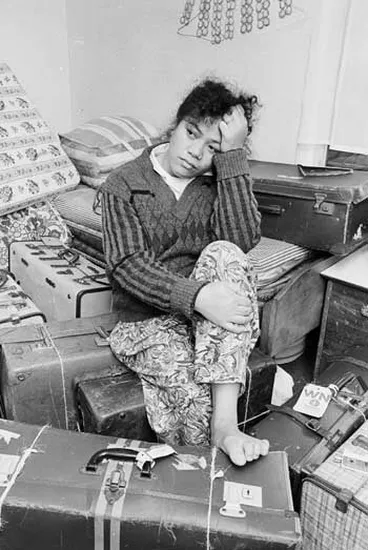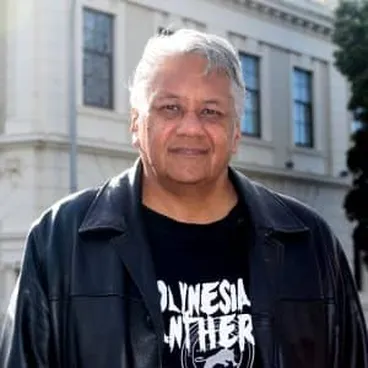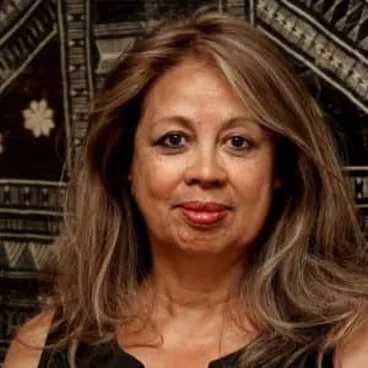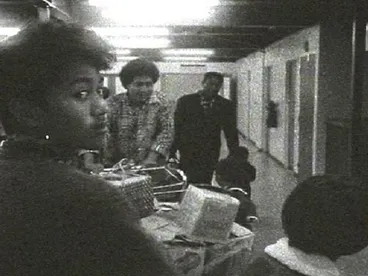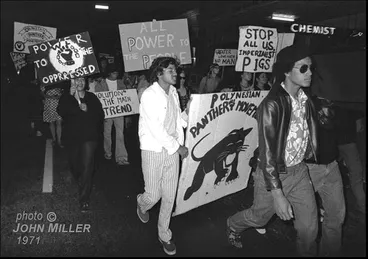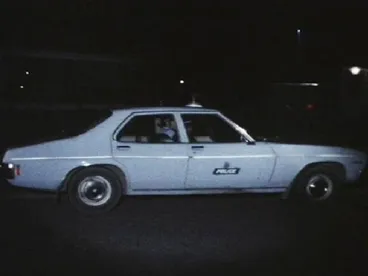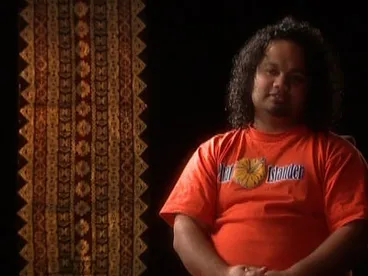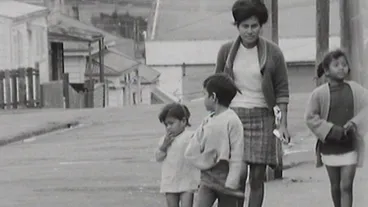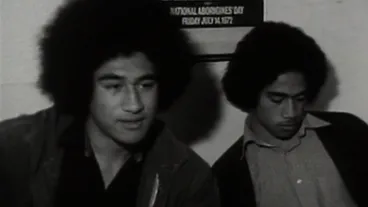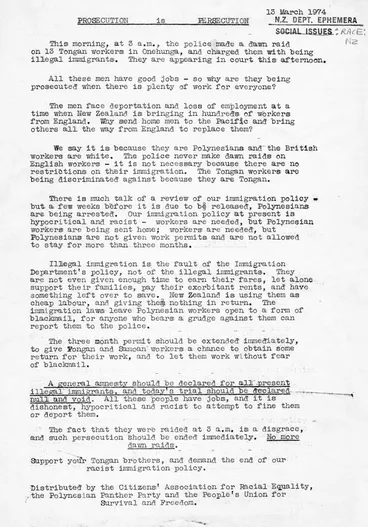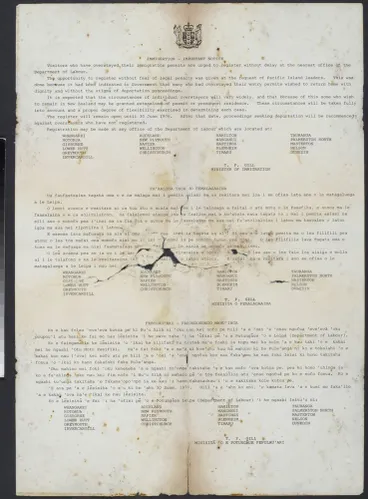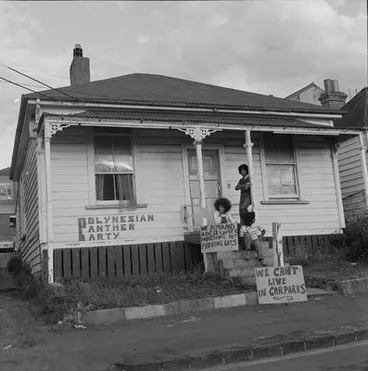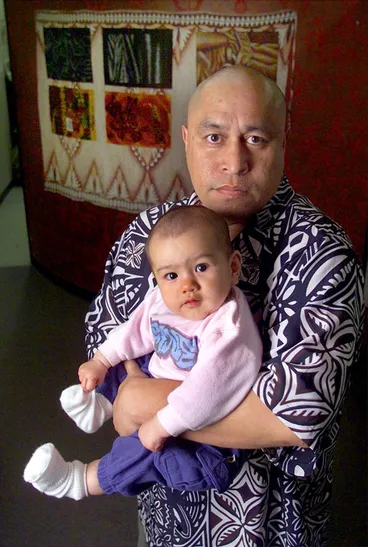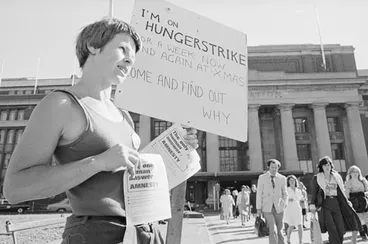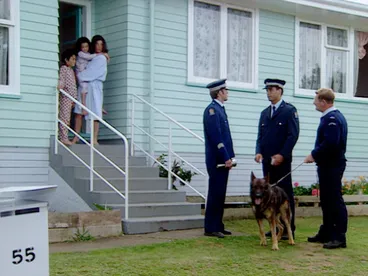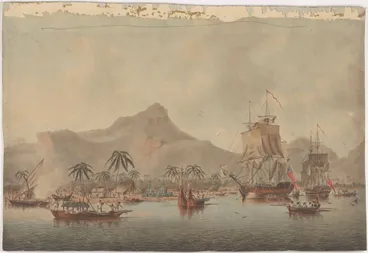The Dawn Raids
A DigitalNZ Story by National Library of New Zealand Topics
The dawn raids were a series of raids carried out at random by the New Zealand police during the mid-1970s against Pacific immigrants. In New Zealand, intolerance towards Pacific migrants increased during the 1970s, particularly after a decline in the economy and the oil crisis of 1973. SCIS no: 1961716
In 2021 a team of artists celebrated links between the Polynesian Panthers and the American Black Panthers. The result was a large, colourful and collaborative mural. Whakaako mural collective includes Emory Douglas, Huriana Kopeke-Te Aho, Huma MacKenzie, Toa Taihia, Tigilau Ness, and Chris McBride.
Tāmaki Makaurau Polynesian Panther mural
Uploaded by DigitalNZ user National Library of New Zealand Topics
Teaching about the Polynesian Panthers and the dawn raids
Manatū Taonga, the Ministry for Culture and Heritage
Once a Panther — our history our words
Services to Schools
Government makes apology over Dawn Raids
Services to Schools
Dawn Raids (New Zealand)
National Library of New Zealand
Pasifika petitioner moved to tears by 'surprise' dawn raids apology
Services to Schools
Waking up to the Dawn Raids (Aotearoa) Untold Pacific History
Services to Schools
How the Polynesian Panthers gave rise to Pasifika activism
Radio New Zealand
The Māori student activist group, Nga Tamatoa (the young warriors), worked alongside the Polynesian Panthers in Auckland to highlight the plight of Māori and Pasifika peoples, and the realities of being brown in Auckland in the 1970s. Together they lobbied hard for improved resources and services for their people. Over the years, close relationships formed between members of the two groups. They had a common purpose, to change racist attitudes, promote human rights, and work towards self-determination. In this photograph from 1972, members of Nga Tamatoa sit on the steps of Parliament in Wellington. hey undertook a sit-in on Parliament grounds for 3 weeks, living in tents.
Group of young Maori on steps of Parliament
Alexander Turnbull Library
Protest for the repeal of the Citizenship (Western Samoa) Act of 1982
Falema’i Lesa, a Samoan woman living in New Zealand, petitioned the Privy Council in England to be granted citizenship here. In 1982 this resulted in the Council not only granting her citizenship but also deciding that New Zealand citizenship should be given to all Western Samoans born here after 1924. However, the New Zealand government did not agree with this decision, as they were still actively engaged in deporting people from Western Samoa and discouraging more immigration from the Pacific Islands as a whole. They introduced an Act which only allowed citizenship for Western Samoans living here from 14 September 1982 onwards or those who obtained permanent residence after that date.
Alexander Turnbull Library
I said WOGS not dogs!
This cartoon appeared in the National Business Review in 1976 during the height of the dawn raids and the racist slanders towards Pasifika peoples. It depicts the New Zealand Minister of Immigration reproaching a policeman who has captured dogs instead of 'wogs'. ‘Wogs’ was a slang term which referred to all Pasifika peoples, no matter where they originated from. At the time, overstayers from the Pacific Islands made up a small proportion of the total, with most originating from Europe and Australia. This cartoon shows the prevailing attitude towards Pasifika people at this time.
Alexander Turnbull Library
Ana Likio at her home in Waitangirua, surrounded by luggage
The original Evening Post caption for this photograph reads: "Anna Likio at the family's Waitangirua home surrounded by the luggage they had to leave behind. A family of Tongan overstayers deported from Porirua were forced to leave most of their belongings behind in the rush." Ana and her family were deported from New Zealand in 1991. Many Pasifika people arrived in New Zealand under quota schemes in the 1960s and 70s. Sometimes people overstayed their temporary visas, which was ignored until the job market changed and there wasn’t enough work to go around.
Manatū Taonga, the Ministry for Culture and Heritage
Melani Anae:'We said we weren't going to take it anymore'
Radio New Zealand
Racism was all around us | E-Tangata
E-Tangata
Pacific Islanders arrive in New Zealand
Manatū Taonga, the Ministry for Culture and Heritage
A raid on Pacific Islanders
Manatū Taonga, the Ministry for Culture and Heritage
Children of the Migration
NZ On Screen
Dawn Raids
NZ On Screen
Polynesian Panthers
NZ On Screen
Oscar Kightley - Dawn Raids revisited
Radio New Zealand
Tongan overstayers
Manatū Taonga, the Ministry for Culture and Heritage
"Immigration - Important Notice"
Museum of New Zealand Te Papa Tongarewa
Polynesian Panthers and Old House
Auckland War Memorial Museum Tāmaki Paenga Hira
Mua Strickson-Pua and his granddaughter
Manatū Taonga, the Ministry for Culture and Heritage
Action against racism, 1976
Manatū Taonga, the Ministry for Culture and Heritage
Dawn raids
Manatū Taonga, the Ministry for Culture and Heritage
The 1970s New Zealand Dawn Raids
Services to Schools
Overstayers could have information used against them
Services to Schools
Te Puna Wai Kōrero
Services to Schools
The Dawn Raids apology | E-Tangata
E-Tangata
Explore the dark history of the Dawn Raids in 1970s Aotearoa
Services to Schools
Talanoa: Polynesian Panthers on the Dawn Raids
Services to Schools
Pauline Vaeluaga Smith: Dawn Raid (2019)
Services to Schools
Smart Talk: Pacific Sound
Services to Schools
The wood planks that hid Polynesian students from the police
Services to Schools
Once a Panther School Journal Curriculum level: 4; Mar: 2019
Services to Schools
Bill Urale and the Overstayer Clothing Company
Services to Schools
My New Zealand Story: Dawn Raid
Services to Schools
Dawn raids remembered in exhibit
Services to Schools
Polynesian Panthers reflect on 45 years
Services to Schools
Rise Up: The Story of the Dawn Raids and the Polynesian Panthers
Services to Schools
Pacific advocates want meaningful action alongside apology
Radio New Zealand
New mural marks the 50th anniversary of the Polynesian Panthers
Radio New Zealand
People are starting to talk about the Dawn Raids
Services to Schools
Untold Pacific History - Episode 1: Dawn Raids
Services to Schools
Organising against racism, 1970s to early 21st century
Manatū Taonga, the Ministry for Culture and Heritage
Mainstream media must do better after Dawn Raids apology
Radio New Zealand
Brave Flower poem
Services to Schools
Tala Pasifika - The Overstayer
NZ On Screen
The dawn raids: causes, impacts and legacy
Manatū Taonga, the Ministry for Culture and Heritage
Polynesian Panther Party founded
Manatū Taonga, the Ministry for Culture and Heritage
